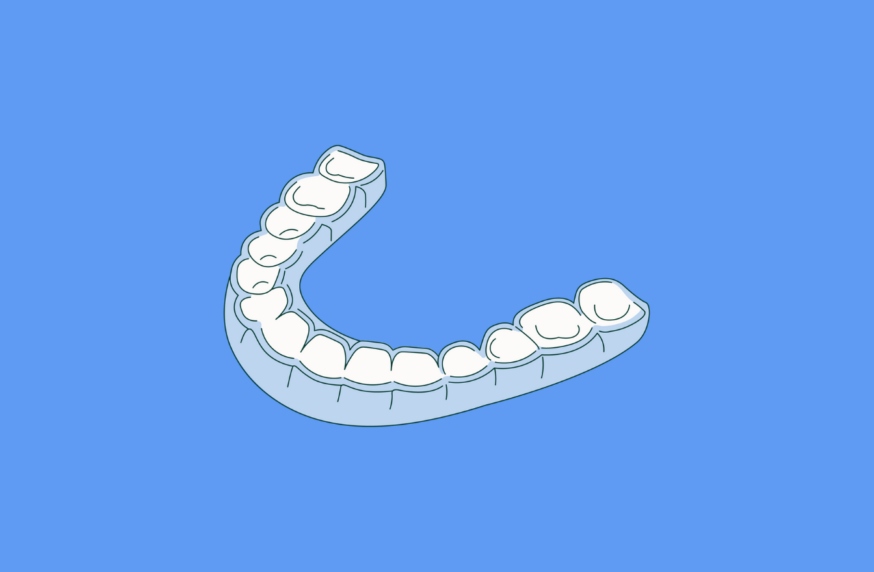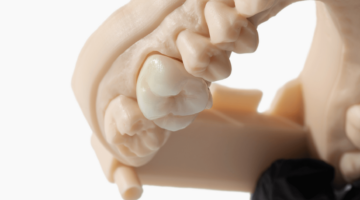Night guards (or to some, occlusal guards) are very much not a one-type-fits-every-treatment. Why are there certain types of night guard materials that serve different uses? For the most part, hard and soft night guards are the most popular materials for occlusal guards. We’ll discuss the applications of each guard, differences, materials used, and level of protection they cover, including alternatives to both guards.
Most dentists have a running debate over which material is better. The answer is: “it always it depends.” Let’s run through which patient scenarios are best for hard night guards and which are best for soft night guards. And offer a solution to the debate you may not have expected.
Hard and soft night guard treatments
Bruxism management
Bruxism is a condition characterized by grinding and clenching of teeth during sleep. This can lead to tooth damage, jaw pain, and headaches. Night guards are important in preventing further damage. They act as a barrier between the upper and lower teeth, absorbing the forces generated during grinding and protecting the teeth from excessive wear.
Night guard materials are either flexible or rigid (this gives them the name hard and soft). Typically, in cases of mild bruxism or where the patient clenches but doesn’t grind, soft night guards are used. This is because they are more flexible and thinner than hard night guards, making them more comfortable to wear, especially during the adjustment period.
On the other hand, hard guards are used by patients with more severe grinding and clenching. A study found them to be more effective in reducing jaw muscle activity. The study also found that soft night guards were associated with an increase in muscle activity. This supports the belief that soft night guards might encourage people to chew or clench down.
Temporomandibular joint (TMJ) disorder relief
TMJ disorder is caused by several factors, such as teeth grinding, stress, and jaw injury. This leads to jaw pain, limited jaw movement, and, in most cases, facial discomfort in surrounding areas.
In this case, night guards aim to reduce the strain on the jaw joint by promoting a more relaxed bite. This can alleviate pain and improve the overall function of the jaw. They are made of hard acrylic, not pliable, and don’t feel flexible in the mouth. They are thicker than soft guards, which adds to their durability and protective properties.
An examination of TMJ disorder patients discovered that soft night guards showed more efficacy and yielded a faster result than hard night guards. However, both night guards display a high level of effectiveness.
Hard night guard overview
Hard night guards are made of acrylic, copolyester, or a similar rigid and tougher plastic durable material. They are generally thicker than soft night guards, which makes them more robust and able to withstand grinding and clenching forces. They are more durable and have a longer lifespan compared to soft night guards. They offer excellent protection against teeth grinding and clenching, helping to prevent tooth damage and reduce the risk of developing TMJ problems.
Hard night guards are recommended for patients who grind or clench their teeth harder than usual or those seeking effective protection against these habits during sleep.
They are best used when there is a need for robust protection to prevent tooth wear and damage caused by severe clenching and grinding of teeth. They are also used for managing symptoms of TMJ disorders, which can be exacerbated by teeth grinding. Partnering with a 3D dental lab allows dentists to fit their patients with intricately accurate applications, ensuring snug and secure fits.
Hard night guards pros
- They are durable, especially for extreme cases of bruxism, and offer exceptional durability and effective prevention of tooth damage.
- They offer superior protection against teeth grinding and clenching.
- They have a longer life span.
Hard night guards cons
- They are more expensive due to the need for customisation by a dentist, which can be more costly.
- Some people find them obtrusive or uncomfortable during the adjustment period.
- They are less flexible and have a rigid structure.
Soft night guards overview
Soft night guards are made from modified ethyl methacrylate, silicone, or a similar elastomer and a pliable, flexible material, providing a softer and more forgiving feel in the mouth. They are thinner than hard night guards, making them more comfortable for patients.
They are generally preferred by patients who prioritize comfort and have mild to moderate bruxism. They are also suitable for patients who have sensitive gums or trouble adjusting to the bulkiness of hard night guards.
Soft night guards are recommended when comfort and ease of adaptation are important for patient compliance. They offer protection against teeth grinding and clenching and can be effective for those with less severe bruxism.
Soft night guard pros
- They are less bulky and feel less obtrusive in the mouth.
- They are more affordable.
- They are easily adapted to the teeth.
- They are softer.
Soft night guards cons
- Their soft nature encourages more clenching, grinding, or chewing, which could cause the guard to wear out easily.
- They have a shorter lifespan because of their reduced durability, potentially needing more frequent replacement.
- They can be more challenging to clean due to their porous nature, which can make them more prone to staining and bacterial growth. Hence, regular cleaning is advised.
- They are liable to offer less protection.
An alternative to both hard and soft night guards?
Hard or soft night guards are the most common solution to various forms of bruxism and TMJ disorders. However, the best of both advanced treatments exists in the form of the Dandy’s Hard/Soft 3D Printed Night Guard especially if night guards do not help remedy the situation or cause discomfort.
As the name indicates this 3D-printed night guard combines the strength of soft night guards with the cushioning comfort of a soft night guard. You can’t beat the durability and superior protection against bruxism-related tooth damage, especially in severe cases with a Hard/Soft 3D Printed Night Guard. They are also favored for their comfort and flexibility—the guard becomes pliable when placed under hot water—making them easier to adapt and creates the perfect fit.
Plus the the appliance is made in one piece with KeySplint Clear Resin so you no longer have to worry about the multi-layer laminate of night guards past. The outside derives comfort from thermodynamic softening tech while the hard core of the guard provides the unwavering stability.
3D printed guards with Dandy
Both hard and soft night guards have their functions in dentistry, and as practitioners, your patients will look to you for guidance on which material to choose. We hope this guide helps you facilitate conversations more proactively and more knowledgeably with your patients. If you’re looking to gain consistent insights from our team of clinical experts, reach out to us to learn more about our lab services, including our Hard/Soft 3D Printed Night Guards.



